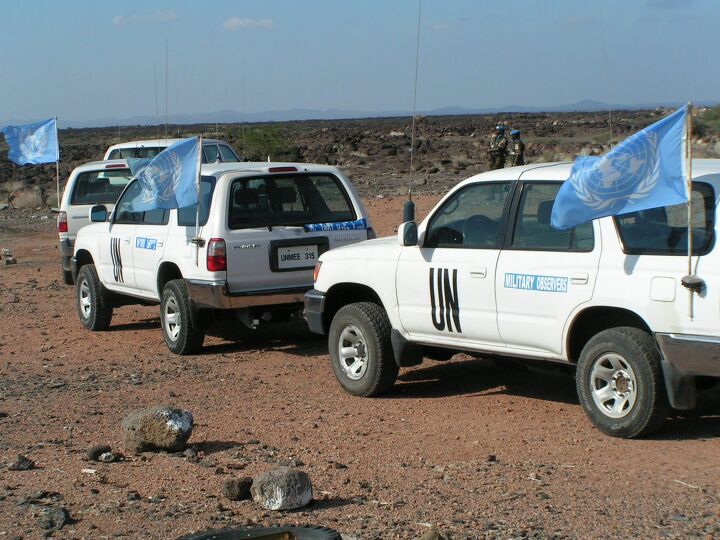#UnitedNations
The End of Leaded Gasoline, Lessons to Remember
Prior to 1970, buying leaded gasoline in the United States was as normal as picking up a carton of eggs or relaxing in your asbestos-laden home. After 1970, the U.S. Congress had officially adopted the Clean Air Act created the Environmental Protection Agency (EPA), and the gradual phasing out of leaded fuel began. While many bemoaned the lackluster performance of the malaise-era automobiles that followed, the rules continued to inform how vehicle manufacturers operated on a global scale.
But leaded gasoline hung in there for longer than you might assume. Most Western nations (including the United States) didn’t totally phase out leaded gasoline intended for passenger vehicles until the 1990s. Central Asia took even longer and parts of the Middle East and Africa continued to offer lead additives well into the 2000s. However, the United Nations Environment Program announced that leaded gasoline had officially become extinct over the summer, with Algeria being the final country to deplete its now-banned supply.
South African Crash Test for Dummies
The Steed 5 pickup, Haval H1 five-door SUV, and the Renault Kwid five-door compact, all achieved poor levels of adult and child protection in crash tests conducted by Global NCAP and AA South Africa yesterday.
UN Panel Decides Japan Violated Carlos Ghosn's Human Rights
The United Nation Human Rights Council’s Working Group on Arbitrary Detention issued a report on Monday stating that Carlos Ghosn’s extended detention in Japan was an unacceptable infringement on his rights — adding that the matter would be forwarded to the UN’s rapporteur on torture, cruel and other inhuman or degrading treatment.
While there are undoubtedly larger examples of human rights abuses inside the automotive industry — Volkswagen’s apparent reliance on Chinese slave labor springs to mind — Japan’s bizarre treatment of the former head of the Renault-Nissan alliance garnered plenty of attention. Accused of financial crimes relating to the Japanese automaker he formally chaired and was once praised for saving, Ghosn was subjected to repeated arrests and strict limitations on who he was allowed to contact. Despite his having fled the country in a form befitting of a secret agent, the UN is still claiming his treatment ahead of the repeatedly delayed trial was tantamount to abuse.
40 Countries Agree - Automatic Braking Should Be Mandatory
Forty countries, led by Japan and the European Union, have agreed to require passenger cars and light commercial vehicles to come equipped with automated braking systems starting as soon as 2020.
According to the United Nations Economic Commission for Europe (UNECE), the new regulation will become compulsory for all countries that adopt it during an upcoming June session. However, the measure will only apply to vehicles operating at “low speeds,” which the U.N. claims is anything under 42 mph.
European-Backed UN Amendment Brings Autonomous Vehicle Future Closer
While autonomous vehicles are still in the early stages of testing, a few of the European members of the United Nations have laid the groundwork for the self-driven future to come sooner than later.
Capsule Review: Toyota HiLux Surf (United Nations Edition)
Diesel and Baby Blue to strike fear into the hearts of our enemies
The durability of the original Toyota HiLux, known in the United States as simply “Truck,” is the stuff of legend, especially if you enjoy Top Gear. It often seems that only rust can kill these simple but durable pickups, which means that in areas where rust does, in fact, sleep, they are effectively immortal. My daily ride in Abu Dhabi is a Fortuner, the HiLux’s Asian cousin.
But this isn’t my first foray into Toyota reliability. My graduate level work in this field came from my time as a UN Unarmed Military Observer (UNMO) on a peacekeeping mission in Ethiopia and Eritrea in 2004. The patrol vehicle dejuir was the Toyota HiLux Surf (aka the 4Runner). But rather than the V-6, the UN standard issue at the time was a 4 cylinder turbo diesel mated to a 5 speed manual.
United Nations: This Is Your Car On Ethanol
A chicken could become as unreachable as caviar in many poor countries, warns a study of the OECD and the United Nations. Chicken is projected to rise in price by 30 percent in the next ten years – inflation adjusted. Other staple foods such as corn, sugar or cooking oil are seen rising in price by twenty percent. Why? On one side of the ledger is higher demand, mainly from China and India. On the other side: „Increasingly, the crop doesn’t end up in the pot, but as fuel in the tanks of cars,“ says the German magazine Der Spiegel.






















Recent Comments